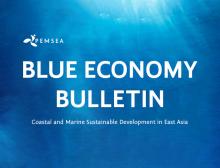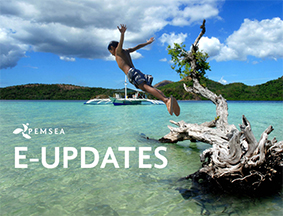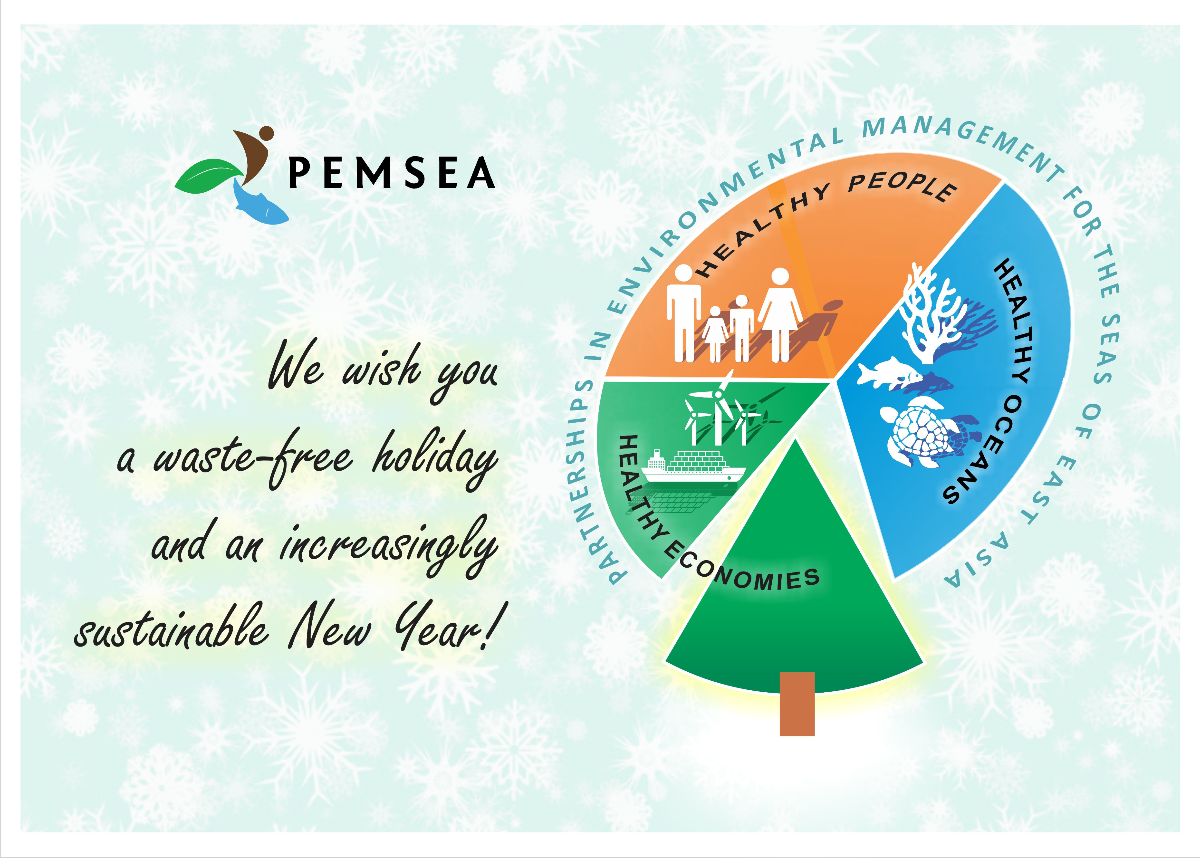
Breadcrumb
Blue Economy Bulletin June 2020
Welcome to the PEMSEA Blue Economy Bulletin for June 2020. The first half of 2020 saw the rise of COVID-19 throughout the world, including the East Asian region. This has slowed down the pace of the implementation of blue economy plans and programs, but at the same time has provided the space to recalibrate economies to better utilize blue economy approaches. PEMSEA has continued to work during this period, and a new Secretary General has been named for the PEMSEA Network of Local Governments (PNLG), who has pledged to help boost blue economy implementation in the region at the local level. We also share a paper on integrating blue economy principles into the governing framework of Timor-Leste, and progress in the ATSEA-2 project, which is working towards achieving a blue economy in the Arafura and Timor seas.
Outside of PEMSEA, new reports on global fisheries and aquaculture and on seagrass meadows highlight the crucial importance the sustainability component of the blue economy has for the environment and human health and livelihoods. One example of increasing sustainability is the blue swimming crab fisheries of Thailand. The seafood industry in Viet Nam has been encouraged to diversify its products.
A new toolbox released by BlueHealth serves to help asses the impacts of urban planning in an integrated framework. Integrated thinking is evident in Timor-Leste, where guidelines have been developed to ensure marine mammal eco-tourism is sustainable for wildlife and coastal communities. Meanwhile, the Philippines has developed an action plan for sustainable consumption and production and a shift to a more circular economy, and the GEF Council has approved $700 million for use in urgent environmental action during the COVID-19 pandemic.
Included near the end of this email are virtual events that one can participate in during the month of July, and recordings of past ocean webinars. Follow the latest updates on blue economy and coastal sustainable development in East Asia on Facebook and Twitter (@PEMSEA). We welcome your feedback, and please let us know if there are other blue economy topics you would like to see in future newsletters and programs.
E-Update May 2020
Welcome to the May 2020 PEMSEA e-update. PEMSEA continues to work to promote its vision of healthy ocean, people, and communities during this time. With the release of our Annual Report 2019, we share stories such as that of Timor-Leste's Green School Program and many others. We also share a paper on the Blue Economy developed by the Australian National Centre for Ocean Resources and Security (ANCORS), in collaboration with PEMSEA and the Government of Timor-Leste, and our message for World Oceans Day, on the use of integrated coastal management (ICM) as a core part of the pandemic and post-pandemic strategy to ensure the sustainable management and development of our coasts and oceans.
News from elsewhere is dominated by COVID-19 and climate change, two issues which both require large-scale action from across the world. COVID-19 is alleviating pressure on the environment, but is harming coastal livelihoods, and damaging progress in plastic recycling. Meanwhile, more research on climate change suggests it may cause ecosystems to collapse sooner, physiologically alter fish, and expose billions to dangerous heat.
In between newsletters, follow us on Facebook and Twitter (@PEMSEA) for the latest updates.
Blue Economy Bulletin April 2020
Welcome to the PEMSEA Blue Economy Bulletin for June 2020. The first half of 2020 saw the rise of COVID-19 throughout the world, including the East Asian region. This has slowed down the pace of the implementation of blue economy plans and programs, but at the same time has provided the space to recalibrate economies to better utilize blue economy approaches. PEMSEA has continued to work during this period, and a new Secretary General has been named for the PEMSEA Network of Local Governments (PNLG), who has pledged to help boost blue economy implementation in the region at the local level. We also share a paper on integrating blue economy principles into the governing framework of Timor-Leste, and progress in the ATSEA-2 project, which is working towards achieving a blue economy in the Arafura and Timor seas.
Outside of PEMSEA, new reports on global fisheries and aquaculture and on seagrass meadows highlight the crucial importance the sustainability component of the blue economy has for the environment and human health and livelihoods. One example of increasing sustainability is the blue swimming crab fisheries of Thailand. The seafood industry in Viet Nam has been encouraged to diversify its products.
A new toolbox released by BlueHealth serves to help asses the impacts of urban planning in an integrated framework. Integrated thinking is evident in Timor-Leste, where guidelines have been developed to ensure marine mammal eco-tourism is sustainable for wildlife and coastal communities. Meanwhile, the Philippines has developed an action plan for sustainable consumption and production and a shift to a more circular economy, and the GEF Council has approved $700 million for use in urgent environmental action during the COVID-19 pandemic.
Included near the end of this email are virtual events that one can participate in during the month of July, and recordings of past ocean webinars. Follow the latest updates on blue economy and coastal sustainable development in East Asia on Facebook and Twitter (@PEMSEA). We welcome your feedback, and please let us know if there are other blue economy topics you would like to see in future newsletters and programs.
E-Update March 2020
Welcome to the second PEMSEA e-update of 2020. PEMSEA, together with people, organizations, and governments around the world, has had its operations affected by Covid-19. We encourage all readers to practice best hygiene, safety, and physical distancing measures in dealing with this pandemic. In light of the potential impacts on large groups of people, we are not including upcoming events in this newsletter. We are glad to share the progress of some of our projects, which our staff are endeavoring to continue as best as possible in a manner that ensures their safety and the safety of the communities we work with. In between newsletters, follow us on Facebook and Twitter (@PEMSEA) for the latest updates.
Blue Economy Bulletin February 2020
Welcome to the first Blue Economy Bulletin of 2020. This year sees work beginning for the GEF/UNDP/PEMSEA Project on Implementation of the Arafura and Timor Seas Regional and National Strategic Action Programs Phase (ATSEA2). For this, the project is seeking to hire a number of individuals to take part in the project in various roles. Preference is for individuals from the four ATSEA countries: Australia, Indonesia, Papua New Guinea, and Timor-Leste.
There is good news for the world's tuna, as there are reports that 8 formerly overfished tuna stocks are thought to now be sustainable and a group of Indonesian companies have committed to improving their longline tuna fishing. Meanwhile new rules have been established to protect rays in the Pacific.
An increase in low-carbon energy generation mean that 2019 saw no increase in energy-related greenhouse gas production compared to 2018. 2019 also saw a record for the amount of money issued as green bonds. However, new research has called into question the carbon sequestration impacts of marine snow.
Follow the latest updates on blue economy and coastal sustainable development in East Asia on Facebook and Twitter (@PEMSEA). We welcome your feedback, and please let us know if there are other blue economy topics you would like to see in future newsletters and programs.
E-Update January 2020
Welcome to the first of PEMSEA's 2020 e-updates. We would like to open the year by sharing information about our SEA Knowledge Bank (SEAKB), which had its contents and features expanded in 2019. The High Level Panel for the Sustainable Ocean Economy has released the first two of its Blue Paper Reports, The future of food from the sea and The expected impacts of climate change on the ocean economy. The climate change paper is timely, given the past 10 years were the hottest in history.
The UN is drafting new plans to replace the expired and largely unachieved Aichi biodiversity targets, with the aim of halting further extinction. These targets will be too late for the Chinese paddlefish, which has been declared extinct by researchers. The target to reach a deal by 2020 to prevent overfishing has also been missed.
Global consumption is rising, reaching 100 billion tonnes annually last year. China has taken action to reduce its waste output, announcing bans on some single-use plastic items. Uncollected waste is thought to have exacerbated flooding in Jakarta over the New Year period.
In between newsletters, follow us on Facebook and Twitter (@PEMSEA) for the latest updates.
PEMSEA's 2019
Dear PEMSEA partners and friends,
2019 was an exciting year of expansion for PEMSEA. As we pause for the year end and recharge for the New Year, here are 10 moments that highlight how the work of PEMSEA expanded over the past year, through new thinking, to new places, to new sectors, and with new partners!
E-Update November 2019
Welcome to the November PEMSEA e-update. This month saw the initiation of Phase 2 of the Arafura and Timor Seas project, which will work to improve the sustainability of these two seas. PEMSEA has also seen continued cooperation with its long-term partners in Xiamen, with the Xiamen Municipal Government being awarded a leadership award for its work in the PNLG and for ICM, and with Xiamen University collaborating with PEMSEA to hold a 7-day study tour for sustainable coastal development for PNLG and PNLC members. In between newsletters, follow us on Facebook and Twitter (@PEMSEA) for the latest updates.
Blue Economy Bulletin October 2019
Welcome to the October edition of our Blue Economy Bulletin. In conjunction with this October's Our Ocean conference, PEMSEA released a new report highlighting our experience in the blue economy investment space. Informed by pilot studies, the report is based on a synthesis of primary and secondary research on the latest trends and practices related to ocean investment, and blue economy and private sector engagement in collaboration with organizations, funds, and investment experts. It also informed a published paper on mainstreaming private and public investment in the blue economy.
Such investments are becoming increasingly popular, with over $63 billion pledged to restore ocean health in the Our Ocean conference. Ocean health is key to sustaining natural capital, such as coral reefs and whales, which provide critical ecosystem services. Recovery and sustainability have been highly visible in the Philippines, where parts of the Pasig River system and the island of Guimaras have seen significant environmental restoration, and there is a national effort to ensure the sustainability of blue swimming crab harvests. Further progress has been made to deal with marine plastic pollution, with a new report on standardizing the measurement of waste leakage, and another report highlighting the impact a circular economy could have on climate change. Meanwhile, attendees from local governments throughout Southeast Asia met to discuss the plastic waste challenges facing them.
Follow the latest updates on blue economy and coastal sustainable development in East Asia on Facebook and Twitter (@PEMSEA). We welcome your feedback, and please let us know if there are other blue economy topics you would like to see in future newsletters and programs.


